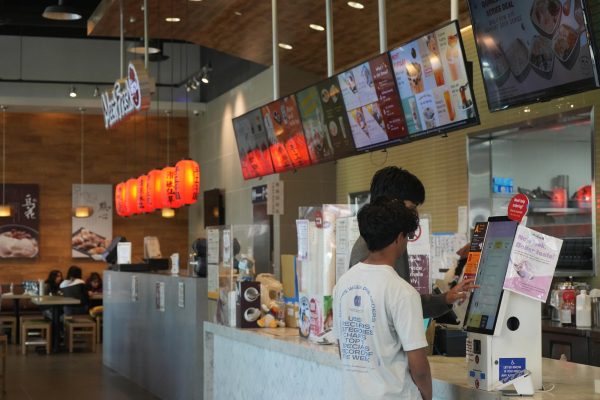Addressing the golden elephant in the room
Examining the relationship between wealth and academic achievement at MVHS
The many ways money contributes to academic success is often under acknowledged.
Before this school year, life science teacher Jaime Vazquez had worked at four other schools in his six-year teaching career, and he states that each one has a distinct culture. Although he is leaving MVHS after only a year because of declining enrollment, Vazquez says his experience at MVHS has been profoundly different than at other schools because of its high academic standing and relatively wealthy student population.
“I’ve only really taught in schools that were low income, as in 98% had free reduced lunch,” Vazquez said. “At Monta Vista, I have kids who are fabulously wealthy, extravagantly wealthy — there is such economic power here at Monta Vista that was not present at other schools, and that puts things into perspective for me.”
In contrast to Vazquez’s short time at MVHS, guidance counselor Sylvia Lam has worked at MVHS since 2000. With her 23 years of experience, Lam has noticed that students now work harder to compensate for more selective college admissions. She says the most critical factor in student success is their community, especially parental influence as role models. However, Lam also acknowledges the role of money in offering opportunities that allow students to succeed.

“Money gives access to resources,” Lam said. “So if a student wanted to take a class outside for enrichment, or if they needed some additional tutoring support, or if they wanted to do an ACT prep class, being in a community where your parents can provide you with those resources helps a lot. Whereas in a lesser community, if they don’t have that, then they’re at a disadvantage. In an ideal world, we want to be in a place where we all have equity, and I think the problem is that there is no equity.”
Vazquez agrees with Lam and says money is a factor in the school’s academic success. Growing up in poverty, he has seen the harmful effects firsthand and says poverty causes self-doubt, making it harder for students from less affluent backgrounds to succeed.
Furthermore, Vazquez says students at MVHS are privileged regarding their connections to influential people, as this access to opportunity allows students to appear more competitive in their applications, reinforcing the existing financial hierarchy.
“I have some kids in mind whose parents are the CEOs [or] the CFOs of certain organizations or companies,” Vazquez said. “If your people are connected to an institution that has the opportunity to reach out to other people for, let’s say, employment or research, that’s access — those are resources. Now, if you do not know anybody whose parent is the CFO or the CEO of something, can you get those same opportunities? No, of course not. When you amass financial capital in a specific area, resources will go up, and those resources tend to feed into themselves.”
In addition, senior Milind Maiti says living in the MVHS community comes with high housing prices. The area’s high rent costs caused his family to recently move out of their Cupertino rental unit into a larger house further away from MVHS.
“I think housing prices have gotten out of hand,” Maiti said. “One of the things I think [is] a big factor is single-family zoning. I was watching a Vox video, which said that Cupertino has 70 or 80% single-family zoning, and I think that excludes a lot of people — it makes housing completely unaffordable for the middle class.”
Maiti sees the issue as a self-reinforcing feedback loop as schools with affluent families receive more funding through property taxes. He says this makes MVHS out of reach for students from less wealthy families and suggests a more equal distribution of school funding and an expansion of affordable housing units as potential solutions.
“We’re already seeing that enrollment is going to be declining across MVHS, and a large part of that issue is that younger families cannot afford to live in Cupertino anymore,” Maiti said. “If we could build more multifamily apartment complexes or more dense housing, that would definitely allow more people to live here and allow more people to go to [MVHS].”
According to Maiti, more expensive housing is typically positively correlated to academic performance, citing statistics that prove how more affluent individuals tend to do better because they don’t have to spend time on things such as working a job or trying to earn money through other means. Vazquez expands on this, stating that MVHS being in an expensive area only increases students’ ability to do well. He explains that because students here tend to be more prosperous, they are less likely to face the same economic struggles that impact those living in lower-income areas. Because of this, he says MVHS students can devote more time to learning and studying, increasing their likelihood of success.

“If you have more wealthy people at a school, of course, they’re gonna do better relative to other people,” Vazquez said. “I’ve worked in four other schools, [and] I don’t know how many other teachers here at Monta Vista have ever seen the amount of schools that I have. I’ve seen schools where the ceiling is falling off and hitting kids in the heads because the tiles come down. [Do] you think that their priority is to take a test? No, their priority is to survive because sometimes surviving is all you can do.”
However, Lam believes MVHS students’ internal drive to succeed is also a major factor in their academic success. According to Lam, in addition to having access to resources, without hard work, students will not be able to adequately use these resources and succeed.
“[Even if] you’re in a community that has the monetary excess to [have access to educational resources], you [still have to] put forth the effort to do what you need to get to where you need,” Lam said.
Maiti agrees with Lam, attributing the culture of immigrant families and the Silicon Valley environment to why students are more inclined to do well. However, he also says money is the elephant in the room and should be discussed more from an equity lens.
“I think if we’re looking at more of a national context, it should be talked about more — the role that money plays and how we can make sure that schools have more equitable resources, so all schools have all kids on the same playing ground,” Maiti said.
Vazquez adds that the community may know money contributes to academic success but may choose not to acknowledge it. He says he has seen this sentiment with his co-workers’ varying opinions on the subject this year.
“[The role money plays in academic success] is like an open secret — we staff know and address it at various levels, and they also talk to their kids, but they do it differently than I do because I’m my own person,” Vazquez said. “This is my first year here [and] I haven’t made that many connections with my fellow staff members, and I’m not going to because I’m leaving, [but] from what I’ve seen, there are other staff members here who think similarly to myself, and we need more of that.”
According to Maiti, another often unaddressed benefit of the wealth at MVHS is that it helps students with college admission. He believes this makes the school look more attractive from the outside, even though some resources are external.
“Many students don’t have to worry as much about financial aid or those other aspects of [college applications], so they can choose to go to perhaps a more expensive private college as opposed to state schools,” Maiti said. “Also, the whole admissions process is quite expensive with [private] counselors and everything. Money has a big factor in determining how well college applications are written and which schools students get into and finally attend.”
On the other hand, Lam believes the counseling department does a good job promoting resources, primarily through the College and Career Center. She says the work they do to encourage students narrows the gap between the majority of students at MVHS and other students of lesser socioeconomic backgrounds.
“I don’t necessarily think there’s a divide,” Lam said. “It pushes [less affluent students] to work harder because it motivates them even more. Even though they might not have those privileges or access what they are able to, they definitely are good self advocates.”
Coupled with the resources provided by the counseling department, Lam is proud of the success of MVHS students and their ability to work hard. She also attributes the community, saying it has played a crucial role in helping students grow academically.
“I’m proud of our kids,” Lam said. “I feel like it’s a rigorous curriculum, and [students] all work really hard and care deeply about your education. I think a lot of pieces [play a role, including] teachers and the community.”
Ultimately, Vazquez disagrees with Lam on the primary reason for the high educational standing of MVHS and the individual success of many of its students. Vazquez personally believes money — and what students can access with it — has a very significant but often unspoken role in the contribution to the success of students.
“If you have money, what does that connect you with?” Vazquez said. “If you are part of a social circle which nets you research opportunities because of your financial connections, of course, you’re going to be able to do more than those who don’t have any connections. It all comes back to this being a capitalistic society, which means those who have money can do more than those who can’t — it’s pretty straightforward.”















